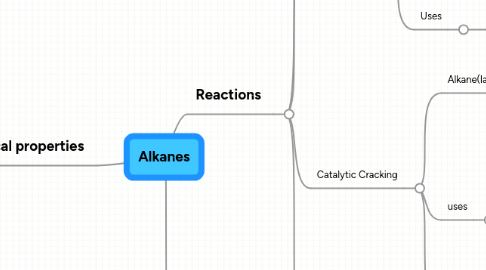
1. Chemical properties
1.1. unreactive generally
1.2. alkenes compared soot lesser
1.3. C% alkenes than less C%
2. Structure
2.1. Bonds
2.1.1. C-C
2.2. Saturated
2.2.1. Contain no C=C
2.2.2. cannot undergo addition rxn
2.3. Formula
2.3.1. C2 H2n+2
3. Reactions
3.1. Source
3.1.1. fractional distilation crude oil
3.1.2. catalytic cracking crude oil
3.2. Combustion
3.2.1. complete
3.2.1.1. sufficient O2
3.2.1.2. Carbon dioxide +water vapour
3.2.1.3. non luminous flame
3.2.2. incomplete
3.2.2.1. insufficient O2
3.2.2.2. Carbon monoxide + soot + unburnt hydrocarbons + water vapour
3.2.2.3. luminous flame
3.2.3. Uses
3.2.3.1. Fuel
3.3. Catalytic Cracking
3.3.1. Alkane(large)--(cracking)-->smaller alkene+smaller alkane/hydrogen
3.3.1.1. Hydrogen produced
3.3.1.1.1. fuel
3.3.1.1.2. reducing agent
3.3.1.1.3. haber process
3.3.2. uses
3.3.2.1. convert large hydrocarbon into smaller hydrocarbon
3.3.2.2. less flammable to more flamable
3.3.2.3. fuel
3.3.2.4. reducing agent
3.3.2.5. haber process
3.3.3. conditions
3.3.3.1. 450°C, SiO2/broken porous pot or Al2O3
3.4. Free Radical substitution
3.4.1. Free radicles
3.4.1.1. chlorine..etc
3.4.2. alkanes react with chlorine (under UV) chloro alkanes + hydrogen chloride
3.4.3. condition
3.4.3.1. UV light
3.4.4. random
3.4.4.1. no. /sequence atoms substituted cannot be predicted
